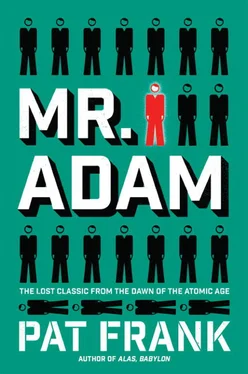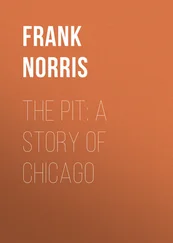“Well, let’s put it in the lap of Congress,” Gableman said. “We’ll have each Senator and Congressman nominate two women—just like they nominate candidates for West Point—and then we’ll give them numbers, and the President can pick a number out of that goldfish bowl we always use for those things.”
“Say, that’s fine,” Klutz agreed. “I think that does it. But what about the international drawings, if we have any?”
“Oh, we’ll leave that to the UN,” said Gableman, “although the State Department won’t like it.”
“Well, thank goodness that’s settled,” said Klutz.
Homer, silent and white-faced, walked out of the room, down the hall, into his own bedroom, and shut the door. I didn’t feel good about the way we’d treated Homer, but obviously, for his own best interests, I felt he should not be allowed to participate in this phase of things.
Later that evening a Special Agent from the FBI came to 5-F. He brought, as a safe hand messenger, the dossier of The Frame which I’d requested the day she left for the Coast. You’d think newspapermen would quit being surprised. They discover that kindly old gentlemen rape, and sometimes chop up, little girls; and church deacons garnish their wives’ soup with arsenic over a period of years; and the impoverished old lady who has been on relief has three hundred thousand in cash stuffed in her mattress; and the lieutenant general who is a hero at home is a heel at the front. Newspapermen ought to quit being surprised, but they never do, and I was surprised at the dossier on The Frame. I had no more read the book of her life correctly than the man browsing through the library, who picks up a volume and reads an occasional sentence and paragraph here and there—skipping whole chapters—and lays it down in ten minutes.
I didn’t even know how long she had lived. I thought The Frame was 25 or 26. She was 31. I didn’t know she had been an honor student at her high school in Chicago, and later at the University of Chicago, although of course I knew her father was Professor Ruppe, the archeologist and scientist. She had taken her B.S. at Chicago, and then come to New York and danced.
In New York, too, she had a weird sort of double life, for even while she danced at that seedy uptown tourist trap she was taking a master’s degree at Columbia.
In 1940 she had gone to Hollywood. She had become engaged to Dr. Alfred Magruder, the atomic physicist from Berkeley. He had been killed in the Mississippi explosion.
For two of the war years The Frame had been employed, along with her fiancé and her father, on the Manhattan Project. After the war she returned to Hollywood, making occasional visits to Bohrville.
She was the author of a number of brilliant papers on nuclear fission. On the Manhattan Project she had served as secretary and assistant to the renowned Dr. Felix Pell. The dossier ended: “Loyalty and patriotism unquestioned.”
So that was The Frame! She seemed a most improbable person, and yet I knew the FBI would not be mistaken in any detail. Long after everyone else in the Adam suite had retired, I sat in the living room, staring into the shadowy vastness of Rock Creek Park, and trying to fit The Frame into the puzzle of Homer Adam. No matter how I arranged the pieces, she didn’t seem to fit—except in one way, and that way so sinister that I instantly wanted to throw it out of my mind, just as the mind rejects and quickly forgets a dream too horrible to remember.
Yet it kept coming back—the possibility that The Frame’s interest in Homer Adam was essentially directed at doing away with him, and in this way completing the death of mankind. I kept telling myself that, all in all, The Frame wasn’t a bad sort of a girl, and the phrase in the FBI report, “loyalty and patriotism unquestioned,” I revolved over and over, and yet the thought kept coming back to me.
It was altogether improbable. And yet was it any more improbable than Mississippi blowing up and wrecking me by an unseen, unfelt radiation without my even knowing it? Was it any more improbable than dropping a bit of material the size of an egg on a great city, and thereby reducing some hundreds of thousands of human beings to a few pinches of ashes?
It was not reasonable for The Frame to plot such a thing. And yet it is not reasonable for grown, mature men who go to church on Sundays, and are kind to their families, to spend the better part of their lives seriously plotting, in General Staff conferences, how to eliminate another nation, and most of its people, in the fewest number of days and hours.
I kept looking for a motive. She might be crazy, of course. She was probably a genius, and most of us believe that genius is a little crazy. Or perhaps, having lost her chance of happiness, she wished all others reduced to her level. This is a very peculiar, and often unnoticed, instinct of people. We saw it one day, in March, 1933, when the nation’s economic inequalities were suddenly leveled by the bank holiday. Since for a time nobody had anything, and all were alike in poverty, everyone was relieved and happy.
I felt that I had to know more about The Frame’s relations with Homer Adam, and right away. I went into his room. He had his face almost buried in the pillow, his long arms stretched around the crumpled pillow as if he had been crushing it. His feet extended, toes down, over the edge of the bed. He was asleep, and I shook him awake. “Hey?” he said. “What’s the trouble?”
“Wake up, Homer, I want to talk to you.”
“All right, Steve. Go ahead. Talk.”
“You’re not mad at me, are you?”
“No. Why?”
“I thought you would be sore because I didn’t stick up for you when you said you wanted to pick the first A.I. mother.”
“Oh, no, I’m not sore. I was just trying to do someone a favor.”
“I suppose you wanted to pick Kathy for the first A.I. mother. In a way, I don’t blame you. But I couldn’t conscientiously encourage your request. It would cause a great stir, and it wouldn’t be fair to Mary Ellen.”
Homer turned over and sat up, his hair wild. He blinked the remnants of sleep out of his eyes and said, “Oh, no. I wasn’t thinking of Kathy. I wasn’t thinking of Kathy at all.”
“Well, who were you thinking about?”
Homer seemed uncomfortable as if the bed were infested with red ants. “I’d rather not say.”
“Oh, come on, Homer, you can tell me!”
“No, I don’t think I’d better.”
“Why, that’s silly, Homer. If you are really set on picking some particular person, maybe I can fix it up. Perhaps it’s Mary Ellen. Perhaps you’d like to have another child yourself. Nobody could blame you for that.”
Homer didn’t look at me. He looked at his hands, and he looked at the door, and he looked everywhere but at me. “No, it was not Mary Ellen,” he said. He hesitated, and then blurted out, “If you have to know, Steve, it was Marge.”
“Marge!” I tried to pull myself together. I knew that I should be urbane about it, and perhaps nonchalant, and that by no means should I alarm Homer, but I knew I wasn’t succeeding.
“Please, Steve,” Homer pleaded. “Please don’t be angry. I was only trying to repay all your favors and your kindness. And I know that more than anything else Marge wants to have children, and she’s always been so nice to me, and she said that she would be delighted to have an Adam child. She’s hinted herself, several times today. She’s always said she’d be proud to have one.”
“Oh, she has, has she?”
“Yes. You see, Steve, that’s all I have to give.”
Well, I thought, I have to be broad-minded, and Homer is really being very decent and sincere, and there isn’t any reason to be jealous. “That is really very decent and generous of you, Homer,” I said. “I am touched. But I think that on behalf of the Smith family I must decline. As a matter of fact, as Gableman pointed out, people would call it nepotism, and charge graft and favoritism within the Administration. Why, it would be just like an official of the Department of the Interior deeding himself oil land owned by the government.”
Читать дальше












